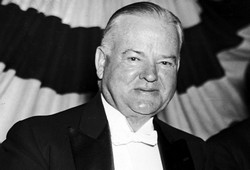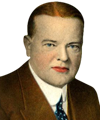Hoover Biography
|
| updated |
Copy Link Code
|
 Herbert Clark Hoover was born on August 10, 1874 in West Branch, Iowa to Jesse and Hulda Hoover. Hoover's father was a blacksmith who also sold farm implements; his mother was a devout Quaker who would form the humanitarianism that marked Herbert Hoover's accomplishments and achievements for the rest of his life.
Herbert Clark Hoover was born on August 10, 1874 in West Branch, Iowa to Jesse and Hulda Hoover. Hoover's father was a blacksmith who also sold farm implements; his mother was a devout Quaker who would form the humanitarianism that marked Herbert Hoover's accomplishments and achievements for the rest of his life.
Young Hoover had what some would call a perfect childhood in West Branch; he spent his first six years in the boundless forests and among the many streams and hills of West Branch. When Hoover turned six years old, however, his life took a drastic turn when his father died from heart disease. Three years later, Hoover's mother died from pneumonia. Orphaned, Herbert moved to the Oregon home of his aunt and uncle, John and Laura Minthorn. Raised in Quakerism, the life of Herbert Hoover built a character and religious beliefs that propelled his moral concern for the needy and abandoned people of the world. He was a plain man, which was reflected in his dress, speech and personality and in his biography of generosity and caring.
Hoover's education was sporadic in ways. He attended Friends Pacific Academy for two and a half years, but did not graduate high school. He took night classes to learn bookkeeping, mathematics and typing, eventually landing a job as his uncle's office assistant in the real estate field, specifically in the Oregon Land Company. Herbert Hoover was in the first class enrolled in Stanford University in 1895 from which he graduated with a degree in geology, as did his future wife, Lou.
In 1899, Herbert Hoover married Lou Henry. They had two sons, Herbert Charles, born August 4, 1903 and Allan Henry, born July 17, 1907. Hoover became a mining engineer who worked on various projects over four continents. Within the next twenty years, the poor orphan from West Branch, Iowa would build a personal fortune worth approximately $4 million.
The biography of Herbert Hoover includes being caught in the Boxer Rebellion of 1900 when he was a mining engineer and executive in China, during which he oversaw relief efforts for foreigners trapped there. Just three years later, Hoover became the head of the Commission for Relief in Belgium, which helped secure food for nine million people after the German invasion. When World War I started, Hoover assisted Americans who were caught in the midst of war in Europe, helping them to return to the United States. President Woodrow Wilson appointed Herbert Hoover to head up the Food Administration responsible for moving American farm products to American troops overseas. Following World War I, Hoover became the overseer of the American Relief Administration that helped Europe feed the people starving after the war.
In 1921, President Warren G. Harding appointed Herbert Hoover Secretary of Commerce, a post he was re-appointed to by Harding's replacement, President Calvin Coolidge. In this position, Hoover was a progressive who believed in a small government, but one that promoted the growth of business. He supported participation in the League of Nations, unions that negotiated the rights of the labor force, and government regulations of the media. Hoover headed efforts to build Hoover Dam and other energy projects throughout the U.S. He also headed the federal disaster relief projects following the great Mississippi Flood of 1927.
In 1928, Herbert Hoover was nominated for and elected as the 31st President of the United States. Immediately following Hoover's election, his biography became plagued with few accomplishments that could help America withstand the effects of the greatest economic collapse in history, the Great Depression. Hoover's response of tax cuts and public works projects to keep people solvent and working, as well as the establishment of the Reconstruction Finance Corporation to keep banks and industries afloat, helped the crippled economy. Business closed their doors and Americans sank into desperate poverty as Hoover helplessly watched. Herbert Hoover's failure to overcome the economic destruction led to his loss of the presidency in 1932.
Herbert Hoover began his autobiography in 1944, but it was not published until it was edited by an historian, George Nash, edited it and had it published in 2011. Entitled Freedom Betrayed, this work is actually Hoover's critique of America's foreign policy from 1930 to 1945, which translates into an attack on Franklin Roosevelt as his actions stood in contrast to Hoover's belief that the U.S. should have let Nazi Germany and the Soviet Union destroy each other rather than for the U.S. to have entered the war as an Allied force.
One of the marks of Hoover's presidency was the "Hoover flag," an indictment of the poverty that assailed American during the Depression and Hoover's failure to end it. The "flag" is the practice of men pulling their pockets outside their pants to demonstrate the "empty pockets" of Americans who were destitute and starving.
At the ripe age of ninety, Herbert Hoover's death resulted from internal bleeding. He died on October 20, 1964 in New York City. Hoover's retirement of thirty-one years is the longest of any president.
